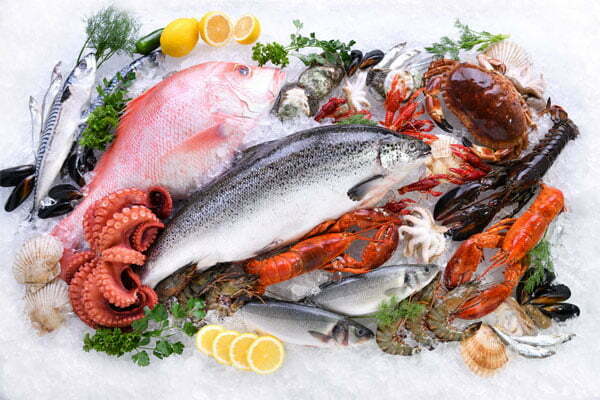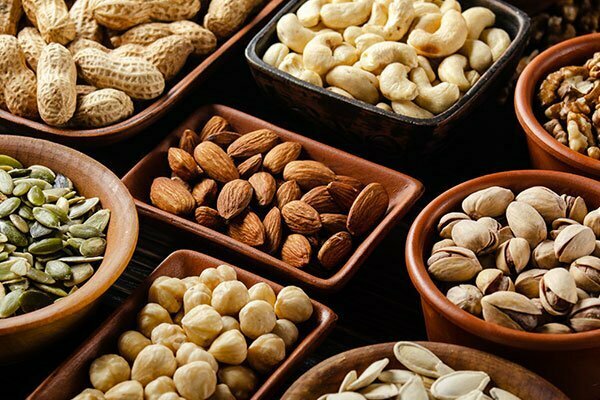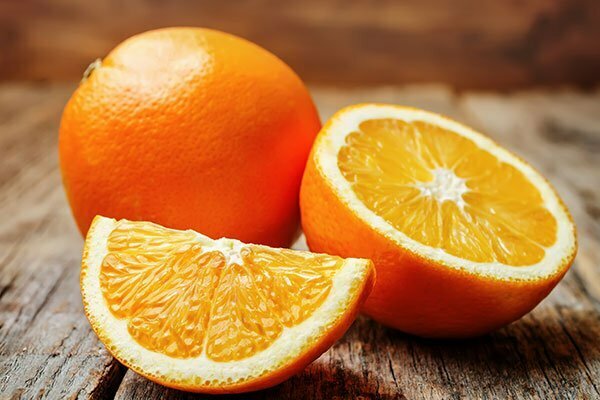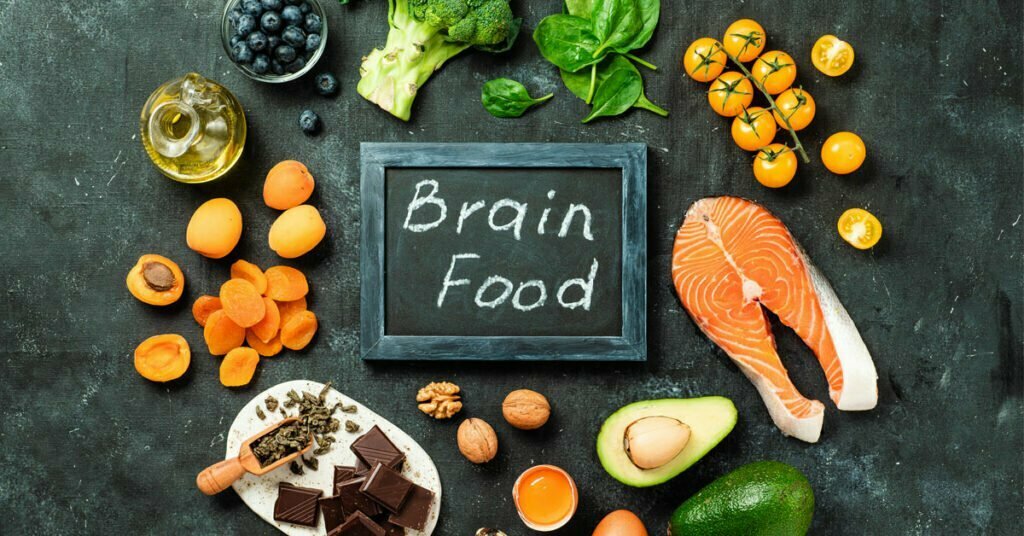Eating well is necessary for your mental as well as your physical health. But what are the foods that are particularly important to keep your brain boosted and in good condition, and healthy?
The human brain is indeed the most magnificent and complex part of your body. It is an organ that serves as the control center of your body. It plays a role in each of the major body systems. It is a good idea to keep your brain in peak working condition. Some research[1] have described nutritional factors which can help influence brain elasticity as well as the effect on central nervous system function. Foods play a role in keeping your brain healthy and can improve mental tasks like memory and concentration.
Some studies,[2] have suggested that dietary changes can lead the way to meaningful improvements in mood and mental well-being. Food is also a very powerful lever in terms of our mental health. That is why choosing and including some brain foods in your diet can help support your brain health and boost your alertness and other functions. Here is the list of the top 11 foods that will help boost your brain.
Oily fish and seafood
Oily fish and seafood may promote a healthy brain and its functionality. Sardines, oysters, mussels, wild salmon, and cod are great sources of omega-3 fatty acids that are essential for the health of the brain. Seafood is a good source of vitamin B12, selenium, iron, zinc, and protein. Also, the most effective omega-3 fats are naturally derived from oily fish in the form of EPA and DHA. These are important for healthy brain function, the heart, joints, and our general well-being. The main sources of oily fish include salmon, trout, mackerel, herring and sardines.
Studies[3] have found that there is a need for vitamin B12 and omega-3 fatty acids to reduce the risk of cognitive decline, although the results of intervention trials using these nutrients in isolation are inconclusive. Research[4] suggests that usual fish intake may be beneficial for the prevention of dementia.

Eggs
Eggs can be an effective brain food. They are a good source of B-6 and B-12 vitamins and folic acid that may prevent brain shrinkage and delay cognitive decline. These vitamins are known to reduce levels of a compound called homocysteine in the blood. Elevated levels of homocysteine are connected with an increased risk of stroke, cognitive impairment, and Alzheimer’s disease.
Other B vitamins, including vitamins B1, B3, and choline in eggs, play an important part in regulating normal brain function. Choline is an important nutrient for the memory-boosting brain chemical, acetylcholine.

Nuts and Seeds
Nuts and seeds, including cashews, almonds, walnuts, and pumpkin seeds, are great snacks that may enhance memory and boost mood. Zinc in seeds is important for enhancing memory and thinking skills. They’re also full of stress-busting magnesium, B vitamins, and tryptophan, a major factor in the good mood chemical serotonin. Nuts and seeds may help protect healthy brain function. A study[5] found that regular consumption of nuts is associated with a lower risk of cognitive decline in older adults.
Eating nuts that have healthy fats, antioxidants, and vitamin E can improve heart-healthy markers, and having a healthy heart is linked to having a healthy brain. Vitamin E protects cells from free-radical damage that may help slow mental decline. Seeds, such as pumpkin and squash seed kernels are excellent sources of magnesium, iron, zinc, and copper. Each of these nutrients is vital for the health of the brain.[6]

Coffee
Coffee is a most beloved beverage due to its ability to help you maintain focus and boost your energy levels. In fact, many people love to have their daily cups right when they wake up to get their day started. This is supported by preclinical and clinical studies[7] where evidence demonstrates that consumption of coffee or tea led to increased alertness and anxiety and showed caffeine-induced beneficial effects on mood and cognition.
In addition to that, the FDA concluded[8] that caffeine has many positive actions on the brain like it can increase alertness and well-being, help concentration, improve mood and limit depression. Lifelong consumption has been connected with the prevention of cognitive decline, and reduced risk of developing stroke, Parkinson’s disease, and Alzheimer’s disease.

Leafy greens and colored fruits
Leafy greens are essential for a brain-healthy diet because they’re affordable, versatile, and have a high ratio of nutrients to calories. A few examples like kale, spinach, arugula, collards, beet greens, and chard are also great sources of fiber, folate, and vitamins C and A. They can be added for salads and to soups, stews, stir-fries, and smoothies.
Colorful fruits may be a better food choice for your brain health. Compounds in brightly colored fruits and vegetables like reddish-purplish foods, red peppers, blueberries, broccoli, and eggplant can affect inflammation, memory, sleep, and mood. Another is avocado, which is high in healthy fats that enhance the absorption of phytonutrients from other vegetables.
Broccoli
Broccoli is a great source of vitamin K, which will help enhance cognitive function and improve brainpower. Vitamin K is a fat-soluble nutrient mainly found in green leafy vegetables as phylloquinone (Vitamin K1). Recent studies[9] show the connectivity in the metabolism of the central nervous system (CNS) and the possibility that a vitamin K deficiency might be related to the onset of cognitive impairment. Broccoli is high in compounds called glucosinolates, which can slow the breakdown of the neurotransmitter, acetylcholine, which we need for the central nervous system to perform properly and keep our brains and memories sharp.
Research[10] reveals how Sulforaphane (SFN) is important, it is a powerful antioxidant and anti-inflammatory phytochemical that has the ability to protect the nervous system from many diseases and toxins and reduce the symptomatic burden of multiple pervasive diseases. It is found naturally in high concentrations in broccoli sprouts.
Blueberries
Blueberries are packed with antioxidants that may delay brain aging and improve memory. Blueberries are known for their sweetness, being nutritious, and being wildly popular. They are low in calories, incredibly good, tasty, and convenient. Studies[11] show that regular moderate intake of blueberries and/or anthocyanins reduced the risk of cardiovascular disease, death, and type 2 diabetes, and enhanced weight maintenance and neuroprotection.
Blueberries have antioxidant and anti-inflammatory properties[12] because the fruits and leaves of berries have high amounts of polyphenols, such as flavonoids, which act as potent antioxidants and these compounds are beneficial for brain aging and neurodegenerative disorders.
Oranges
Oranges and other foods that are high in vitamin C can help defend your brain against damage from free radicals. Having higher levels of vitamin C in the blood was associated with improvements in tasks involving focus, memory, attention, and decision speed.[13]
Oranges or other foods that are high in vitamin C can help defend your brain from damage from free radicals. Vitamin C is a powerful antioxidant that helps fight off free radicals that can damage brain cells. It supports brain health as you age and may protect against conditions like major depressive disorder, anxiety, schizophrenia, and Alzheimer’s disease. You can get high amounts of vitamin C from other foods like bell peppers, guava, kiwi, tomatoes, and strawberries.

Dark Chocolates
The flavonoids in chocolate may help protect the brain, it could boost both memory and mood. Studies[14] have shown the beneficial and positive effect of cocoa flavanols on several cognitive functions and neuroplasticity and indicates benefits. Dark chocolate is combined with nutrients that can positively affect your health. It is one of the best sources of antioxidants you can find. Dark chocolate is combined with nutrients that can positively affect your health. It is one of the best sources of antioxidants you can find. Dark chocolate can improve your health and lower your risk of heart disease. It has flavonoids that constitute a group of polyphenols with numerous effects on behavior and cognition. It reduces neuroinflammation and oxidative stress seems to reverse symptoms associated with Alzheimer’s disease, enhances cognitive function at a behavioral level, and attenuates cognitive decline promoted by brain disorders.
Green tea
The caffeine in green tea boosts brain function in a way that has been found to improve alertness, performance, memory, and focus. Green tea also has other components that make it a brain-healthy beverage. Green tea is an excellent beverage to boost alertness. Its antioxidants protect the brain, and L-theanine helps you relax. L-theanine is an amino acid that can cross the blood-brain barrier and increase the activity of the neurotransmitter GABA, which helps reduce anxiety and makes you feel more relaxed.
Soy products
The nutrients in soy products can lead to improvements in cognitive and memory functions. A recent study[15] indicates that dipeptides that come from soy foods can help minimize memory degradation and can reduce the risk of diseases like Alzheimer’s. Soybean products are rich in a particular group of antioxidants called polyphenols that reduce the risk of dementia and improve cognitive abilities during regular aging processes. These chemicals act as antioxidants, providing a range of health benefits throughout the body.
Takeaway
Many foods can help keep your brain healthy. The foods we eat can have a big impact on the structure and health of our brains. Eating a brain-boosting diet can support brain function. Dietary changes can lead to meaningful improvements in mood and mental well-being. The foods listed above may help your brain’s purpose. By strategically including these foods in your diet, you can help support your brain health and boost your alertness, memory, and mood.
This knowledge of good brain-boosting foods for the brain is just as important as foods that can negatively impact brain health. In the next article, we will talk about the worst foods for your brain that you should limit or avoid.
References:
- Omega-3 fatty acids and their role in central nervous system – A review – PubMed. (n.d.). PubMed.
- The best brain foods you’re not eating. (2022, January 24). The New York Times – Breaking News, US News, World News and Videos. https://www.nytimes.com/2022/01/24/well/eat/brain-food.html
- Novel insights into the effect of vitamin B₁₂ and omega-3 fatty acids on brain function. (n.d.). PubMed.https://pubmed.ncbi.nlm.nih.gov/26809263/
- Fish consumption and risk of incident dementia in elderly Japanese: The Ohsaki cohort 2006 study. (n.d.). PubMed.https://pubmed.ncbi.nlm.nih.gov/31477191/
- Jennings, K. (n.d.). 11 best foods to boost your brain and memory. Healthline. https://www.healthline.com/nutrition/11-brain-foods#TOC_TITLE_HDR_9
- FoodData central. (n.d.). FoodData Central. https://fdc.nal.usda.gov/fdc-app.html#/food-details/170556/nutrients
- Caffeine induces neurobehavioral effects through modulating neurotransmitters. (n.d.). PubMed Central (PMC). https://www.ncbi.nlm.nih.gov/pmc/articles/PMC7132598/
- Effects of coffee/caffeine on brain health and disease: What should I tell my patients? (n.d.). PubMed.https://pubmed.ncbi.nlm.nih.gov/26677204/
- The relationships between vitamin K and cognition: A review of current evidence. (n.d.). PubMed Central (PMC). https://www.ncbi.nlm.nih.gov/pmc/articles/PMC6436180/
- The neuroprotective mechanisms and effects of sulforaphane. (2019, April). PubMed Central (PMC). https://www.ncbi.nlm.nih.gov/pmc/articles/PMC6611193/
- Recent research on the health benefits of blueberries and their anthocyanins. (n.d.). PubMed. https://pubmed.ncbi.nlm.nih.gov/31329250/
- Biochemical properties and Neuroprotective effects of compounds in various species of berries. (n.d.). PubMed Central (PMC). https://www.ncbi.nlm.nih.gov/pmc/articles/PMC5943949/
- Plasma vitamin C concentrations and cognitive function: A cross-sectional study. (n.d.). PubMed Central (PMC). https://www.ncbi.nlm.nih.gov/pmc/articles/PMC6454201/
- Effect of cocoa and cocoa products on cognitive performance in young adults. (n.d.). PubMed. https://pubmed.ncbi.nlm.nih.gov/33265948/
- https://www.firstpost.com/health/improved-brain-function-reduced-risk-of-sleep-disorders-among-health-benefits-of-adding-soy-foods-to-your-diet-8511631









